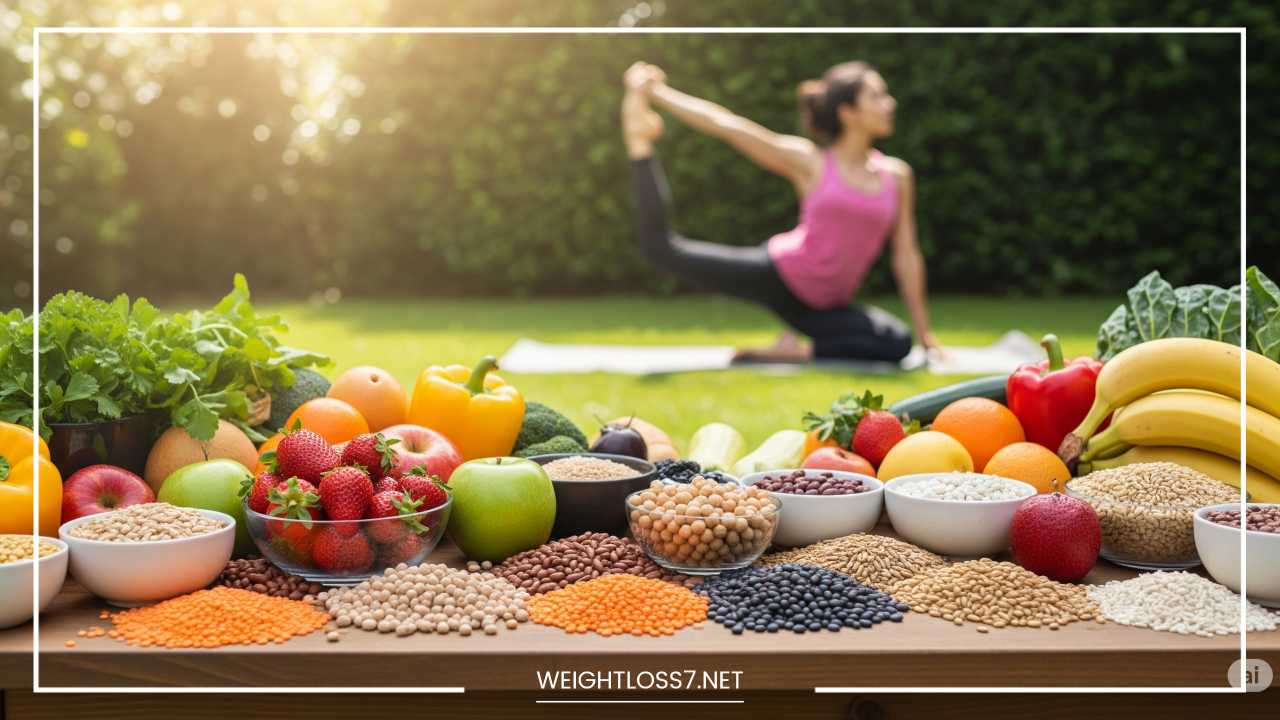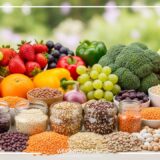How Can You Lose Weight
How Can You Lose Weight: A Comprehensive Guide to Sustainable Weight Loss
Maintaining a healthy weight is not merely about aesthetics; it’s a cornerstone of overall well-being. From reducing the risk of chronic diseases like heart disease and type 2 diabetes to boosting energy levels and improving mental clarity, the benefits are far-reaching. However, in a world saturated with quick fixes and fad diets, the journey to sustainable weight loss often feels shrouded in misinformation. Many popular approaches heavily feature meat and eggs, leading to the misconception that effective weight loss is tied to animal products.
This guide aims to debunk that myth, offering a comprehensive and compassionate roadmap to losing weight effectively and sustainably, entirely within a plant-based framework. We’ll explore the science, practical strategies, and lifestyle shifts that empower you to achieve your health goals, no animal products required.
Understanding Weight Loss: The Energy Equation
At its core, weight loss boils down to a fundamental principle: the energy balance equation. Simply put, to lose weight, you need to expend more calories than you consume. This is often referred to as “calories in vs. calories out.” When your body consistently burns more energy than it takes in, it starts to tap into its stored fat reserves for fuel, leading to weight reduction.
However, this isn’t a simplistic arithmetic problem. Our bodies are complex, and several factors influence how this equation plays out. Metabolism, the sum of all chemical processes that occur in your body to maintain life, plays a crucial role. A faster metabolism means your body burns more calories at rest. Factors like age, genetics, body composition (muscle vs. fat), and activity levels all impact your metabolic rate. While you can’t drastically alter your genetic predisposition, you can influence your metabolism through lifestyle choices, primarily exercise and building lean muscle mass.
The temptation for quick fixes is understandable, but sustainable weight loss prioritizes consistency over drastic measures. Rapid weight loss often stems from severe calorie restriction, which can lead to muscle loss, nutrient deficiencies, and a rebound effect once the restrictive diet ends. True, lasting weight loss is a gradual process that focuses on healthy habits that can be maintained indefinitely, rather than a temporary deprivation. It’s about creating a sustainable lifestyle, not a fleeting diet.
Building a Plant-Based Weight Loss Diet: Fueling Your Body with Nature’s Bounty
The beauty of a plant-based diet for weight loss lies in its inherent abundance of nutrient-dense foods. Fruits, vegetables, legumes, whole grains, nuts, and seeds are packed with vitamins, minerals, antioxidants, and, crucially, fiber. These foods provide substantial volume and satiety for fewer calories compared to their processed or animal-based counterparts.
Fiber, in particular, is a superhero in the weight loss journey. Found exclusively in plant foods, it adds bulk to your meals, helping you feel full and satisfied for longer, thereby reducing the likelihood of overeating. It also aids in digestion, promotes healthy gut bacteria, and can help regulate blood sugar levels, preventing energy crashes and subsequent cravings. Think of a big bowl of lentil soup or a colorful salad loaded with vegetables – they fill you up without weighing you down with excess calories.
One common concern for those transitioning to a plant-based diet for weight loss is protein intake. Rest assured, the plant kingdom offers a wealth of excellent protein sources that are often lower in saturated fat and cholesterol-free. Tofu and tempeh, versatile soy products, are complete proteins, meaning they contain all nine essential amino acids. Lentils, beans (black beans, kidney beans, pinto beans), and chickpeas are excellent sources of protein and fiber. Quinoa, a pseudograin, is another complete protein. Even humble foods like nutritional yeast (often used for a cheesy flavor), soy milk, oats, and various nuts and seeds contribute to your daily protein needs. Diversifying your plant-based protein sources throughout the day ensures you get all the amino acids your body requires.
While plant-based eating is inherently healthy, it’s vital to be mindful of highly processed plant-based foods. The market is increasingly flooded with “vegan junk food” – plant-based burgers, sausages, and desserts that can be high in unhealthy fats, sodium, and refined sugars. While these can be enjoyable in moderation, relying on them for your primary diet will hinder your weight loss efforts and compromise your overall health. Prioritize whole, unprocessed plant foods as the foundation of your meals.
Healthy fats are essential for nutrient absorption, hormone production, and satiety. Focus on sources like avocados, which are rich in monounsaturated fats; flaxseeds and chia seeds, excellent for omega-3 fatty acids; and olive oil, a cornerstone of the Mediterranean diet. These fats, consumed in moderation, contribute to feeling full and satisfied, preventing unnecessary snacking.
Here are some sample plant-based meal ideas and snacks to inspire your weight loss journey:
- Breakfast: Oatmeal with berries and a sprinkle of chia seeds, or a smoothie with spinach, banana, plant milk, and a scoop of plant-based protein powder.
- Lunch: Large salad with mixed greens, chickpeas, quinoa, various chopped vegetables, and a light vinaigrette. Alternatively, a hearty lentil soup with whole-grain bread.
- Dinner: Stir-fry with tofu or tempeh and an abundance of colorful vegetables, served over brown rice. Or, black bean burgers on whole-wheat buns with a side salad.
- Snacks: Apple slices with a tablespoon of almond butter, a handful of raw nuts, vegetable sticks with hummus, or a small portion of air-popped popcorn.
Portion Control and Mindful Eating: The Art of Conscious Consumption
Even with the healthiest plant-based foods, overeating can derail your weight loss efforts. It’s easy to assume that because a food is “healthy,” you can eat unlimited quantities. However, calories still count, and even nutrient-dense foods can contribute to a calorie surplus if consumed in excess.
Mindful eating is a powerful tool to combat overeating. It involves paying full attention to your food – its taste, texture, aroma, and the signals your body is sending. Here are some practical tips:
- Eat Slowly: It takes time for your brain to register fullness. Savor each bite, chew thoroughly, and put your fork down between mouthfuls. This allows your body’s satiety signals to catch up, preventing you from eating past the point of comfortable fullness.
- Use Smaller Plates: This simple visual trick can make your portions appear larger, psychologically tricking you into feeling more satisfied with less food.
- Track Hunger Cues: Before reaching for food, pause and assess your hunger level. Are you truly hungry, or are you eating out of boredom, stress, or habit? Learning to distinguish between physical hunger and emotional triggers is crucial. A hunger scale from 1 (ravenous) to 10 (stuffed) can be a helpful tool. Aim to eat when you’re around a 3 or 4 and stop when you’re around a 6 or 7.
- Avoid Emotional Eating and Binge Triggers: Many people turn to food to cope with emotions like stress, sadness, or boredom. Identify your personal emotional eating triggers and find healthier coping mechanisms, such as going for a walk, listening to music, meditating, or calling a friend. Similarly, identify situations or environments that trigger binge eating and develop strategies to navigate them. For example, if you tend to binge while watching TV, try engaging in another activity or ensuring healthy, pre-portioned snacks are readily available.
Exercise and Movement: Beyond the Scale
While diet plays a significant role in weight loss, physical activity is its indispensable partner. The benefits of exercise extend far beyond simply burning calories; it improves cardiovascular health, strengthens bones and muscles, reduces stress, boosts mood, and enhances overall quality of life.
There are various types of exercise to incorporate into your routine:
- Cardio (Aerobic Exercise): Activities that elevate your heart rate, such as brisk walking, running, cycling, swimming, dancing, or jumping rope. Cardio is excellent for calorie expenditure and improving endurance. Aim for at least 150 minutes of moderate-intensity cardio or 75 minutes of vigorous-intensity cardio per week.1
- Strength Training: This involves working your muscles against resistance, such as lifting weights, using resistance bands, or bodyweight exercises (push-ups, squats, lunges). Strength training is crucial for building and maintaining muscle mass. Why is this important for weight loss? Muscle tissue is more metabolically active than fat tissue, meaning it burns more calories even at rest. The more muscle you have, the higher your resting metabolic rate, making it easier to burn calories throughout the day. Aim for strength training sessions 2-3 times per week, working all major muscle groups.
- Yoga and Pilates: These practices focus on flexibility, strength, balance, and mindfulness. While they may not burn as many calories as high-intensity cardio, they contribute to overall fitness, reduce stress, and can improve body awareness, supporting mindful eating habits.
- Walking: Don’t underestimate the power of consistent walking. It’s accessible, low-impact, and an excellent way to increase your daily activity. Aim for at least 7,000-10,000 steps per day, and look for opportunities to incorporate more movement into your day, such as taking the stairs instead of the elevator or parking further away.
Setting realistic workout goals is essential for long-term adherence. Don’t go from zero to hero overnight. Start small, perhaps with 20-30 minutes of walking three times a week, and gradually increase the duration and intensity as your fitness improves. Find activities you genuinely enjoy, as this significantly increases the likelihood of sticking with them. Exercise should be a source of joy and empowerment, not a chore.
Lifestyle Factors: The Unsung Heroes of Weight Management
Beyond diet and exercise, several crucial lifestyle factors significantly impact your weight and overall health. Overlooking these can sabotage even the most diligent efforts.
- Importance of Sleep: In our fast-paced world, sleep often takes a backseat, yet its link to weight management is undeniable. Chronic sleep deprivation disrupts hormones that regulate appetite. Ghrelin, the “hunger hormone,” increases, while leptin, the “satiety hormone,” decreases. This imbalance leads to increased hunger, cravings for high-calorie, sugary foods, and a reduced ability to feel full. Aim for 7-9 hours of quality sleep per night. Establish a regular sleep schedule, create a relaxing bedtime routine, and optimize your sleep environment.2
- Stress Management: Stress, particularly chronic stress, can wreak havoc on your weight. When stressed, your body releases cortisol, often dubbed the “stress hormone.” Elevated cortisol levels can lead to increased appetite, cravings for comfort foods (often high in sugar and unhealthy fats), and an increased tendency to store fat, particularly around the abdominal area. Finding healthy ways to manage stress is paramount. This could include meditation, deep breathing exercises, yoga, spending time in nature, engaging in hobbies, or connecting with loved ones.
- Hydration’s Role in Appetite and Metabolism: Water is often overlooked in weight loss, but it’s a critical component. Staying adequately hydrated can help you feel full, reducing the likelihood of overeating. Sometimes, thirst is mistaken for hunger, leading to unnecessary snacking. Drinking a glass of water before meals can help3 regulate appetite. Furthermore, water is essential for metabolic processes; even mild dehydration can slow down your metabolism. Aim to drink at least 8 glasses of water a day, and more if you are exercising or in a hot climate. Herbal teas and infused water can also contribute to your daily fluid intake.
Common Mistakes to Avoid: Navigating the Pitfalls
The weight loss journey is rarely linear, and it’s easy to fall into common traps. Being aware of these pitfalls can help you steer clear of them:
- Relying on “Vegan Junk Food”: As mentioned earlier, the rise of plant-based alternatives means there’s a growing market for highly processed vegan foods. While these can be convenient or satisfy a craving occasionally, building your diet around them will likely lead to weight gain, not loss. Many vegan cheeses, processed meats, and desserts are high in calories, unhealthy fats, sodium, and refined sugars, lacking the fiber and nutrients found in whole plant foods. Prioritize whole foods for the vast majority of your meals.
- Skipping Meals or Extreme Calorie Restriction: While creating a calorie deficit is necessary, extreme calorie restriction or skipping meals is counterproductive and unsustainable. It can slow down your metabolism as your body enters “starvation mode,” trying to conserve energy. This often leads to intense cravings, fatigue, and ultimately, binge eating. Instead, focus on consistent, balanced meals that provide adequate nutrition and satiety.
- Expecting Overnight Results: Weight loss is a marathon, not a sprint. The media often portrays rapid transformations, setting unrealistic expectations. Healthy, sustainable weight loss typically occurs at a rate of 1-2 pounds per week. Losing weight too quickly can lead to muscle loss, nutrient deficiencies, and is often unsustainable. Celebrate small victories, focus on consistent effort, and understand that progress may not always be linear. There will be plateaus and minor fluctuations, which are entirely normal.
Creating a Sustainable Plan: Your Blueprint for Long-Term Success
Sustainable weight loss is about building habits that last a lifetime, not just for a few weeks or months.
- Setting Realistic Goals: Instead of aiming to lose 50 pounds in two months, set smaller, achievable goals. Perhaps 5 pounds in a month, or consistently exercising three times a week. Breaking down your larger goal into smaller, manageable steps makes the process less daunting and provides regular opportunities for success and motivation.
- Tracking Progress (Without Obsessing Over the Scale): While the scale can be a useful tool, it shouldn’t be your sole measure of success. Weight fluctuates daily due to water retention, hormonal changes, and bowel movements. Weigh yourself no more than once a week, at the same time and under similar conditions (e.g., first thing in the morning). More importantly, track other indicators of progress:
- Measurements: Measure your waist, hips, and other body parts. Inches lost can be a powerful motivator, even if the scale isn’t moving as quickly.
- How your clothes fit: This is often the most noticeable and satisfying sign of progress.
- Energy levels: Are you feeling more energetic throughout the day?
- Mood: Is your mood improving?
- Fitness levels: Are you able to walk further, lift more, or feel less breathless during exercise?
- Food journaling: Tracking what you eat can provide valuable insights into your habits and identify areas for improvement.
- Importance of Support Systems: You don’t have to go it alone. Building a support system can significantly enhance your success. This could include:
- Friends and Family: Share your goals with supportive loved ones who can offer encouragement and accountability.
- Apps and Online Communities: Many apps offer meal tracking, exercise logs, and community forums. Online groups dedicated to plant-based eating and weight loss can provide a sense of community and shared experience.
- Professionals: For personalized guidance, consider consulting a registered dietitian who specializes in plant-based nutrition or a certified personal trainer. They can help you create a tailored plan and address specific challenges.
Final Thoughts: Embracing a Plant-Powered Life for Lasting Well-being
Losing weight on a plant-based diet is not only possible but incredibly effective and sustainable. By understanding the principles of energy balance, prioritizing whole, nutrient-dense plant foods, practicing mindful eating, incorporating regular physical activity, and addressing crucial lifestyle factors like sleep and stress, you empower yourself to achieve your weight loss goals.
This journey is about more than just numbers on a scale; it’s about fostering a deeper connection with your body, embracing nourishing foods, and cultivating habits that support long-term well-being. Focus on the incredible health benefits that come with a vibrant, plant-powered lifestyle – increased energy, improved digestion, reduced disease risk, and a greater sense of vitality. Let go of the pressure for perfection and instead, commit to consistent effort, self-compassion, and the joy of nourishing your body with the incredible bounty of the plant kingdom. Your path to a healthier, happier you starts now, with every delicious, plant-powered bite.


















